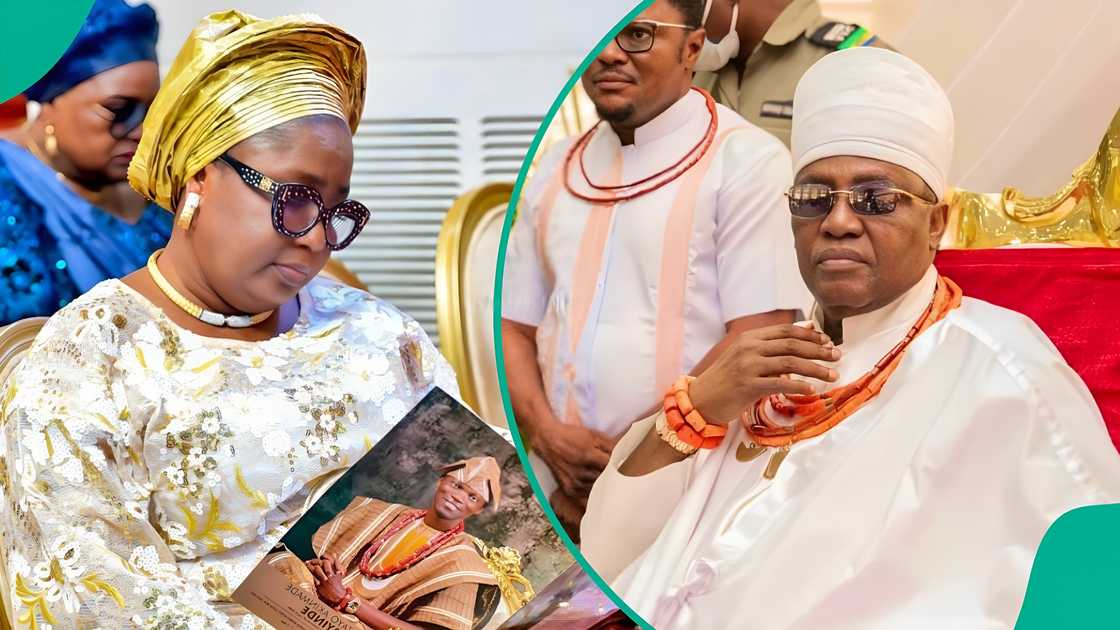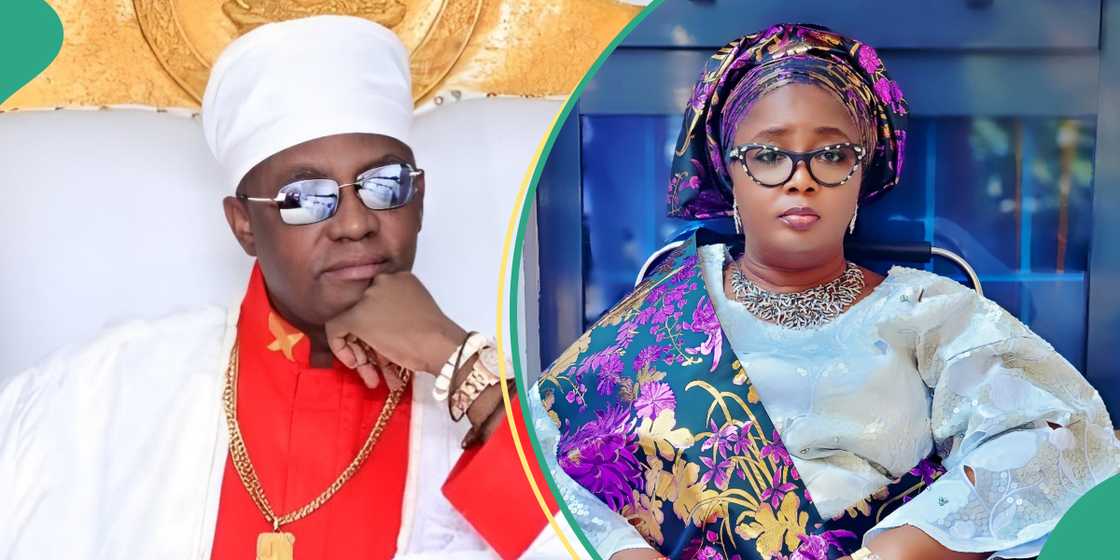The Humbling of Tinubu’s Daughter at the Benin Palace, by Oluwafemi Popoola
Editor’s note: In this piece, journalist Oluwafemi Popoola recounts how a visit to the Benin Palace by President Tinubu’s daughter, Folashade Tinubu-Ojo, turned into a royal reminder of cultural boundaries. He captures what the Oba of Benin’s firm response says about power and respect in Nigeria today.
When I came across the story of what transpired in the Benin Palace a few days ago, I was struck by its weight and symbolism. The sight of Nigeria’s First Daughter, Folashade Tinubu-Ojo, in her capacity as Iyaloja-General of Nigeria, walking straight into the lion’s den of tradition, the Benin Palace. I almost pitied her. The visit was a moment where politics, tradition, and identity collided on sacred ground. It felt like witnessing two worlds, modern ambition and ancient custom, standing face to face in quiet confrontation.
The encounter began in the Festival Hall of the Edo State Government House. With the full confidence of one who carries both presidential DNA and inherited market leadership, Mrs. Tinubu-Ojo declared:
“The position of Iyeki was vacant. I am here to inaugurate all the market leaders of the various local governments and Pastor Josephine as the leader of the state.”

Source: Twitter
Simple, final, and presidential in tone. You would think she was handing out ministerial portfolios on behalf of her father.
From the government house, her entourage proceeded to the palace of Oba Ewuare II. And it was here that the day’s events turned from a simple courtesy call into a defining lesson. With deference, Mrs. Tinubu-Ojo explained her mission, telling the Oba that she had just inaugurated Pastor Josephine and had come to seek his royal blessings. It must have seemed the natural next step—secure the palace’s approval to legitimize her actions.
For standing before Oba Ewuare II is no small thing. He is not a governor one can lobby, nor a political appointee who can be threatened with redeployment. He is Omo N’Oba, custodian of an ancient throne and guardian of traditions that predate every democratic experiment this country has seen.
Oba Ewuare listened, his regal face betraying the patience of an elder listening to a child who insists that two plus two equals five. And then, like the sharp strike of an ancestral gong, he asked:

Read also
Video: Tinubu speaks on what he believes about Islam, Christianity: "I never told my wife to change"
“Do you know the role of Iyeki in Benin culture?”
The question was surgical. It was the kind of question that stripped her titles, her letterhead introductions, and her borrowed authority in one fell swoop. You could almost hear the palace walls chuckling.
The Oba went further. He explained that in Benin, there is no such thing as a “general” Iyeki. Each market has its Iyeki—sacred women leaders tied not just to trade but to shrines, rituals, and ancestral obligations. Their roles are spiritual, cultural, and deeply tied to the throne. The novelty of a “general Iyeki,” he said pointedly, is alien to Benin culture.
Imagine the humiliation. The president’s daughter, who had written a flowery letter only months earlier styling herself as “Chief Dr. Mujidat Folashade Tinubu-Ojo (FCIML), the Iyaloja-General of Nigeria, and the First Daughter of President Bola Ahmed Tinubu (GCFR),” now schooled like a primary school pupil reciting multiplication tables incorrectly. She had come to secure the Oba’s blessing, but instead received a tutorial in cultural anthropology—free of charge.
It is almost comical, if not tragic, how power intoxicates. Here was a woman who assumed that because she inherited her late mother’s role as Iyaloja of Lagos, she could baptize herself Iyaloja-General of Nigeria, and from there, export Yoruba market culture into Benin Kingdom. She imagined herself as a national franchise manager of markets, distributing leadership as though she were handing out sachets of tomato paste.
But Edo is not Lagos. Benin Palace is not Alausa. And Oba Ewuare II is not one of those politicians desperate for Aso Rock’s favor. In fact, the monarch’s sharp rebuttal was a quiet reminder that there are pockets of Nigeria still resistant to political colonization.
I laughed aloud when I read the Oba’s words:
“In Benin, you are in the home of culture. Iyaloja is alien to us. Every Iyeki has a special relationship with the palace. Are you aware of that?”
It was as though he was saying:
“Madam, with all due respect to your father’s presidency, keep your market crown in Lagos. Here, tradition reigns supreme.”
I reflected deeply on what this meant. In Yoruba land, the position of Iyaloja—the mother of the market—is revered. It carries enormous influence, and in Lagos especially, it is woven into both the cultural and political fabric of society. The Iyaloja oversees trade, mediates disputes, and represents market interests before traditional and political authorities. It is no surprise that the title has been elevated to “Iyaloja-General,” carrying the implication of national significance.

Source: Twitter
Yet, as the Oba of Benin made clear, Edo has its own system, its own leadership structure, and its own sacred practices. To attempt to overlay the Yoruba model onto the Benin Kingdom without regard for its traditions was not just presumptuous; it was culturally insensitive. It risked erasing the very uniqueness that makes Nigeria a mosaic of traditions.
This incident is a parable about the Nigeria we live in today. Too often, we assume that because something is done in one part of the country, it must be accepted everywhere. We forget that this country is not a monolith but a federation of peoples, cultures, and traditions that predate colonial borders.
This entire saga reminded me of Kwame Gyekye’s reflections in Tradition and Modernity. Gyekye argued that while modernization is inevitable, it must never be pursued at the expense of cultural integrity. To bulldoze tradition in the name of modern associations is to invite chaos. And chaos, indeed, is what the Iyaloja-General brought to Edo—though thankfully, the Oba stood firm.
One could almost hear the ancestors of Benin whispering approval in that palace chamber. For these are not mere market titles; they are sacred offices. The likes of Queen Idia, whose face adorns the famous Benin ivory mask, did not sacrifice and pray for the survival of the kingdom so that centuries later, a “general Iyaloja” could appoint market leaders by fiat.
What the Iyaloja-General faced that day was more than personal humiliation. It was a public rebuke of entitlement, a cultural slap on the wrist, a reminder that power has boundaries. Even a president’s daughter can be humbled when she steps on sacred soil without understanding its customs.
Achebe once warned us:
“When the moon is shining, the cripple becomes hungry for a walk.”
And so it was here. The moon of her father’s presidency shone brightly, and Madam Iyaloja-General, intoxicated by its glow, attempted a walk across Benin’s sacred terrain. But the Oba reminded her that not every walk is permitted, and not every moonlight is meant for straying.
If there is any lesson in this spectacle, it is this: Nigeria’s unity cannot be built on the arrogance of one culture trying to dominate another. Respect must remain the currency of our coexistence. And if our leaders, or their children, forget this, there will always be an Oba Ewuare II somewhere, waiting patiently with the ancestral whip of correction.

Read also
“I knew you'd not disobey”: Tinubu to Soyinka as president inaugurates newly-renovated National Theatre
In the end, I say let her humiliation stand as a national parable. Markets may be for trade, but tradition is not for sale. And the next time Madam Iyaloja-General considers franchising her title beyond Lagos, she might want to ask herself:
“Do you know the role of Iyeki in Benin culture?”
Because the Oba has already answered that question for her—loudly, clearly, and to the delight of an entire kingdom.
Oluwafemi Popoola is a journalist, political analyst, and columnist with 8 years’ experience, providing in-depth commentary on governance, public policy, and democracy in Nigeria and beyond
Disclaimer: The views and opinions expressed here are those of the author and do not necessarily reflect the official policy or position of Legit.ng.
Source: Legit.ng





